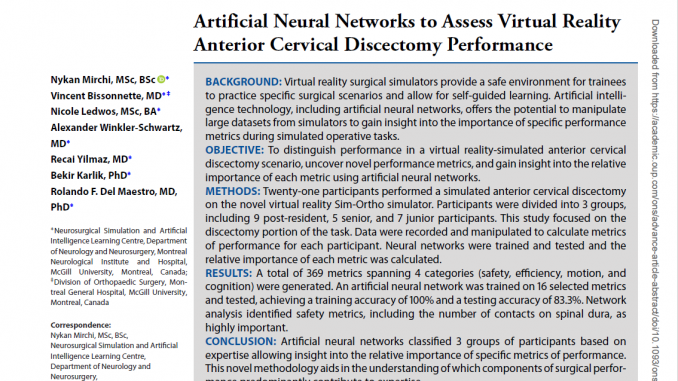
Nykan Mirchi, MSc, BSc, Vincent Bissonnette, MD, Nicole Ledwos, MSc, BA Alexander Winkler-Schwartz, MD, Recai Yilmaz, MD, Bekir Karlik, PhD Rolando F. Del Maestro, MD, PhD
Operative Neurosurgery (December 2019)
https://doi.org/10.1093/ons/opz359
BACKGROUND:
Virtual reality surgical simulators provide a safe environment for trainees to practice specific surgical scenarios and allow for self-guided learning. Artificial intelligence technology, including artificial neural networks, offers the potential to manipulate large datasets from simulators to gain insight into the importance of specific performance metrics during simulated operative tasks.
OBJECTIVE:
To distinguish performance in a virtual reality-simulated anterior cervical discectomy scenario, uncover novel performance metrics, and gain insight into the relative importance of each metric using artificial neural networks.
METHODS:
Twenty-one participants performed a simulated anterior cervical discectomy on the novel virtual reality Sim-Ortho simulator. Participants were divided into 3 groups, including 9 post-resident, 5 senior, and 7 junior participants. This study focused on the discectomy portion of the task. Data were recorded and manipulated to calculate metrics of performance for each participant. Neural networks were trained and tested and the relative importance of each metric was calculated.
RESULTS:
A total of 369 metrics spanning 4 categories (safety, efficiency, motion, and cognition) were generated. An artificial neural network was trained on 16 selected metrics and tested, achieving a training accuracy of 100% and a testing accuracy of 83.3%. Network analysis identified safety metrics, including the number of contacts on spinal dura, as highly important.
CONCLUSION:
Artificial neural networks classified 3 groups of participants based on expertise allowing insight into the relative importance of specific metrics of performance. This novel methodology aids in the understanding of which components of surgical performance predominantly contribute to expertise.
KEY WORDS: Anterior cervical discectomy, Artificial intelligence, Artificial neural networks, Machine learning, Simulation, Surgical training, Virtual reality
